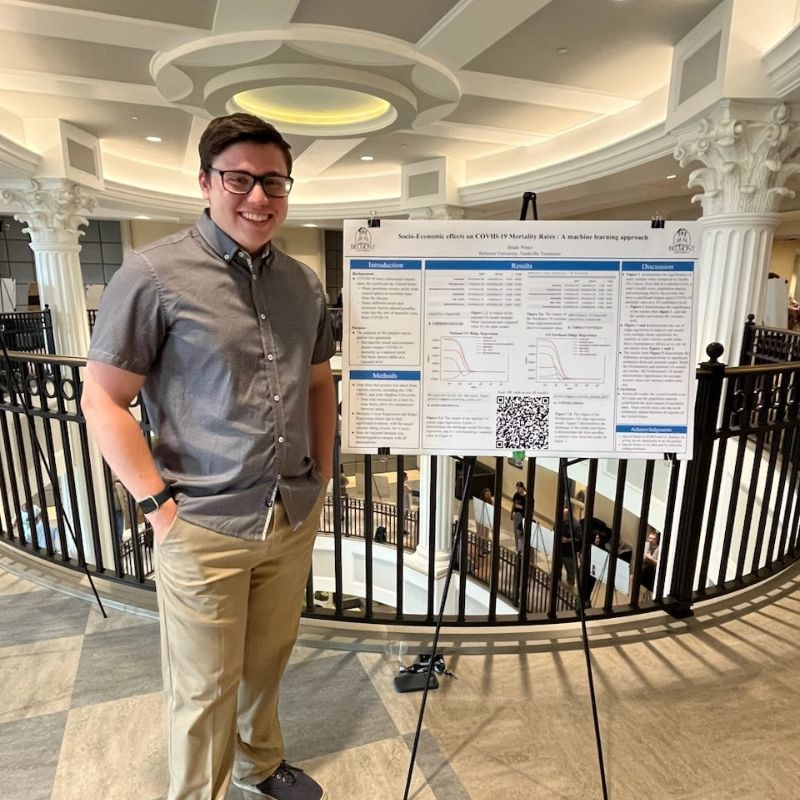The power of early undergraduate research at Belmont University
For many aspiring scientists, the opportunity to conduct meaningful research often feels like an academic process reserved for graduate students. However, at Belmont, students like Brady Pinter are proving that substantive, student-led research can commence long before a student receives his or her undergraduate degree.
Pinter, a junior from Cleveland, discovered his passion for data-driven problem-solving as a sophomore. Initially a computer science major, he pivoted to a data science path after an Intro to Data Science class with Dr. Christina Davis and never looked back.
 Davis’ data science class prompted Pinter to begin his own independent research project examining the impact of social and economic factors on COVID-19 mortality rates. These factors included the percentage of state populations below the poverty line, state population density and the quality of a state’s health care system.
Davis’ data science class prompted Pinter to begin his own independent research project examining the impact of social and economic factors on COVID-19 mortality rates. These factors included the percentage of state populations below the poverty line, state population density and the quality of a state’s health care system.
Pinter was then accepted into Belmont’s Summer Undergraduate Research Fellowship in the Sciences (SURFS) program, allotting him additional resources and allowing his initial foray into research to blossom into a compressive study.
"It's amazing because it's something I can put on a resume and something I can show to people," Pinter explained. "But most importantly, [research] developed my problem-solving skills. Tackling a problem by myself and finding solutions to issues I bumped into – that's invaluable experience to have as an undergraduate in college."
After completing his study, Pinter presented his findings at the Belmont Undergraduate Research Symposium (BURS), re-branded to SPARK in 2024, a day dedicated to student researchers presenting their findings. BURS forwarded Pinter’s research experience even further by giving him a platform to defend his research and sharpen his communication skills.
“It was anxiety-inducing because you are in a room full of academics. The toughest part is answering the questions they ask you like ‘Why did you do it this way?’ or ‘Did you ever consider this idea?’” said Pinter. “But it’s a great test of sticking to what you know and being confident in myself.” 
The importance of undergraduate research extends far beyond building an impressive resume. For Pinter, it opened doors to new opportunities and sparked a passion for using data science to address real-world challenges.
Both of Pinter’s parents work in health care, and he has always had a passion for helping people the same way his parents do. His research on COVID-19 mortality rates contributed to the scientific community's understanding of the pandemic and served as a bridge between his academic pursuits and career interests.
"I'm thinking about working in the health care industry, trying to find connections for people who live in underdeveloped communities," he said. "I want to use math, science and data science skills to see where they need help so that they can get better access to health care in the future."
Belmont's commitment to undergraduate research is evident in its approach to education. The College of Sciences & Mathematics emphasizes the importance of "doing science" from day one. This philosophy encourages students to explore different fields and discover their passions through hands-on experience.
For Pinter, the supportive environment at Belmont played a crucial role in his research journey. "Being in a small department, I have one-on-one discussions with my professors regularly. This has led to additional opportunities because they send me emails or talk to me in person about projects that align with my interests."
The accessibility of professors at Belmont creates an ideal environment for students to thrive, and Pinter encouraged students to take advantage of that unique community.
"Go see professors during office hours if you need assistance,” he urged. “They are always happy to help and want to build relationships with you. These connections can lead to advice, internships and potentially research opportunities."
By providing early access to meaningful research opportunities, Belmont is empowering students like Pinter to develop critical thinking skills, gain hands-on experience and make real contributions to their fields of study — all before they receive their diplomas.
As Pinter looks toward his future, he reflected on the impact of his undergraduate research experience.
It's not just about the data or the results. It's about learning how to approach complex problems, communicate findings and use science to make a difference in the world.
Learn More
Learn more about data science and undergraduate research opportunities.


